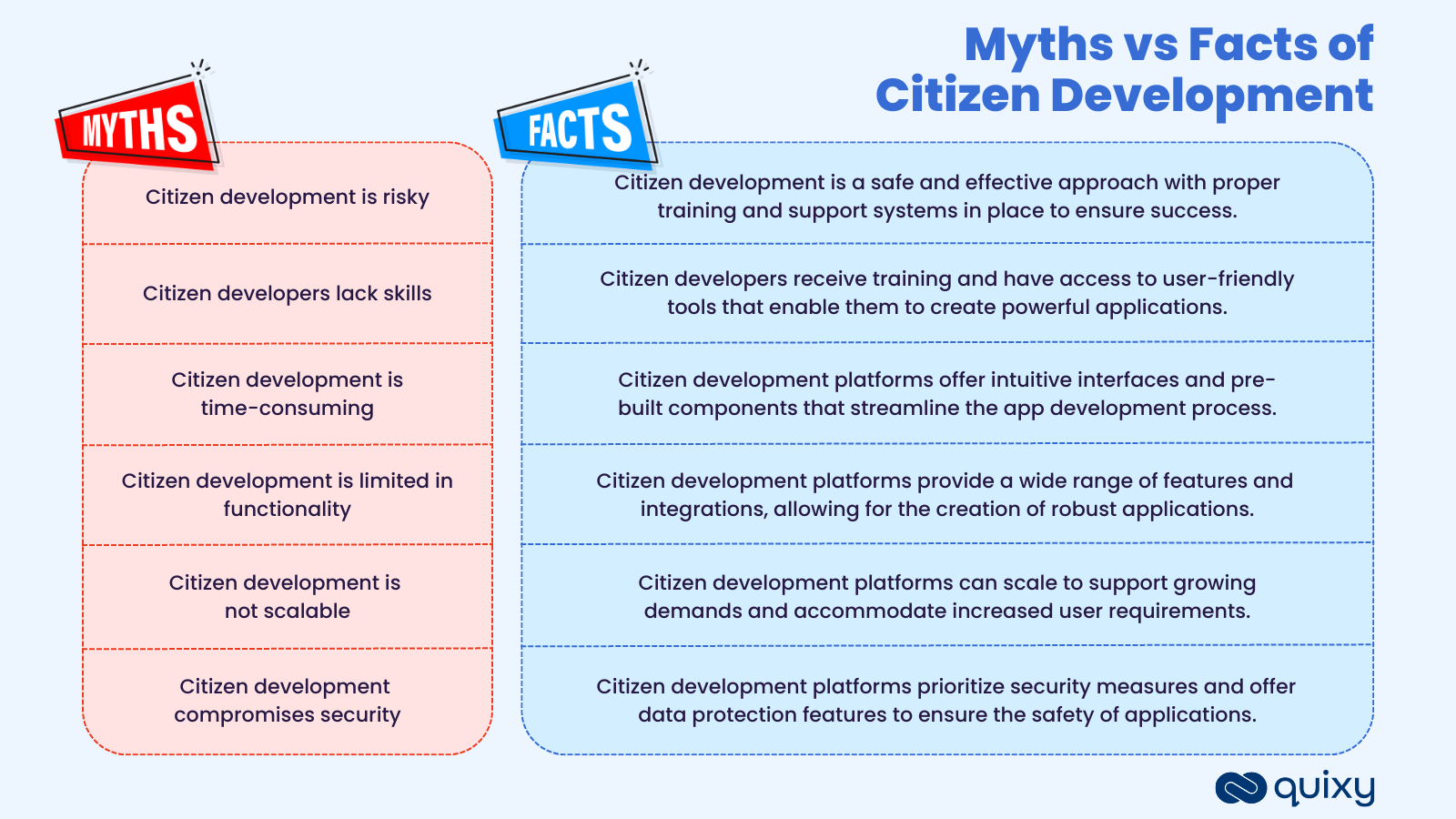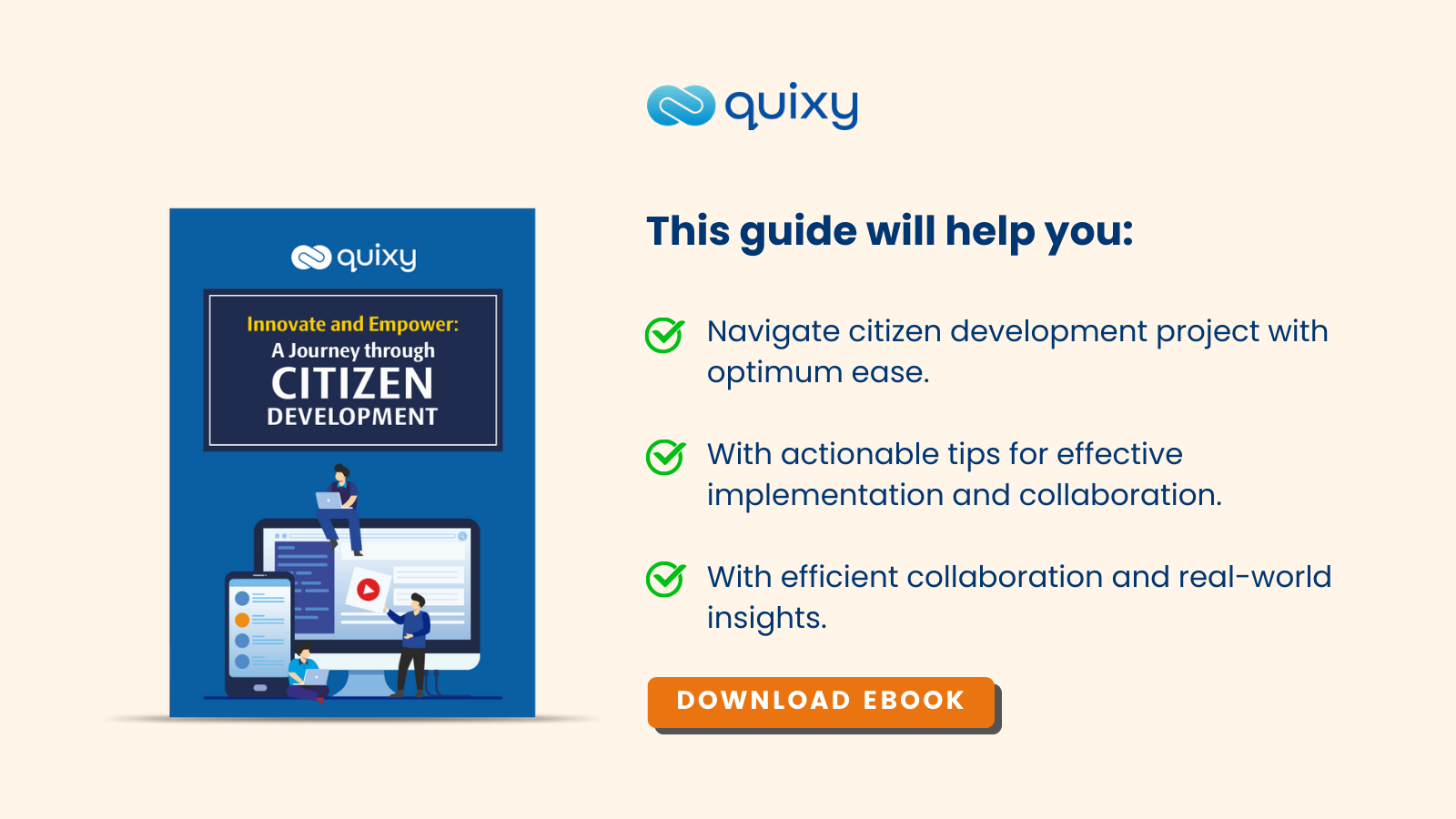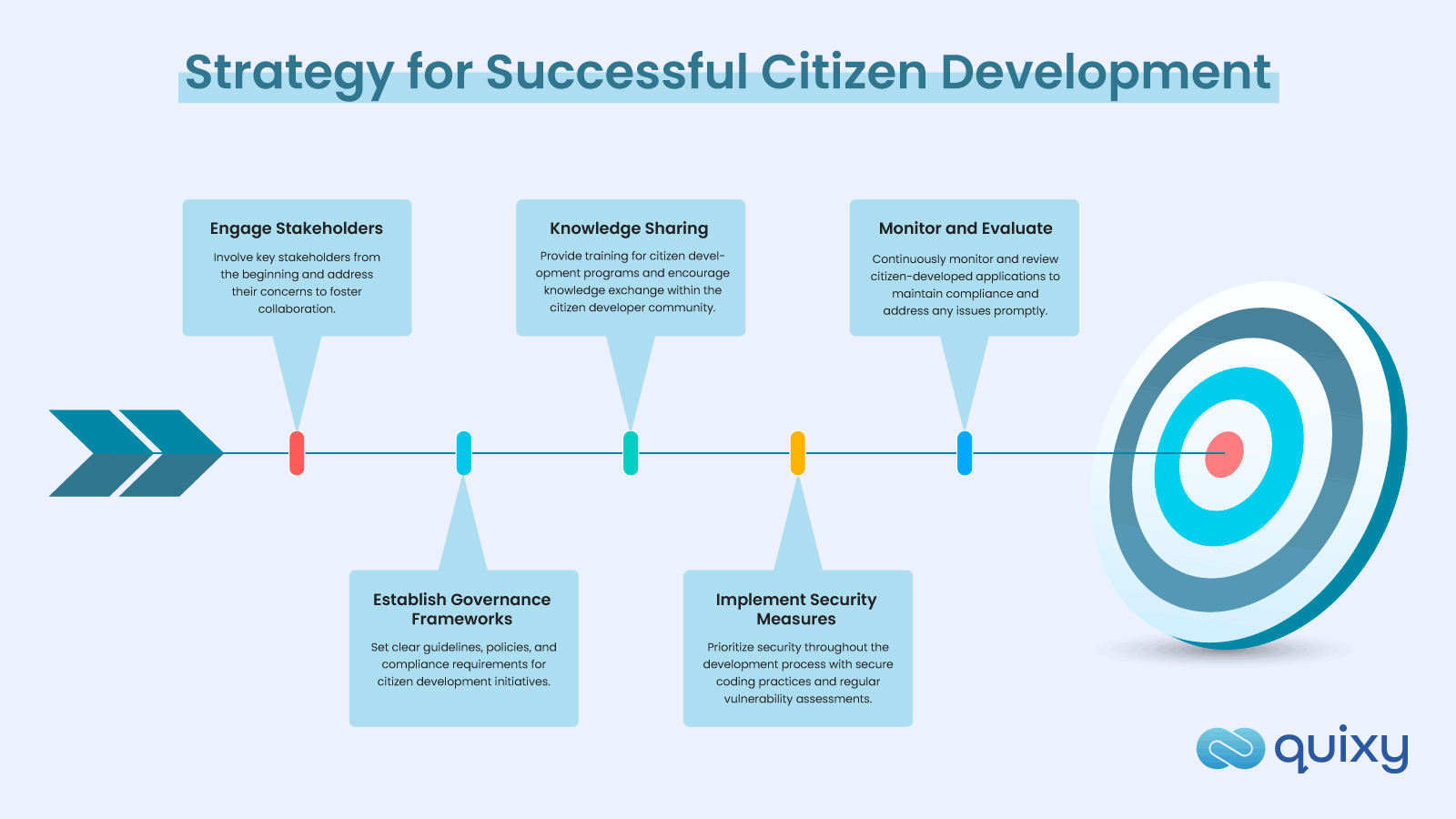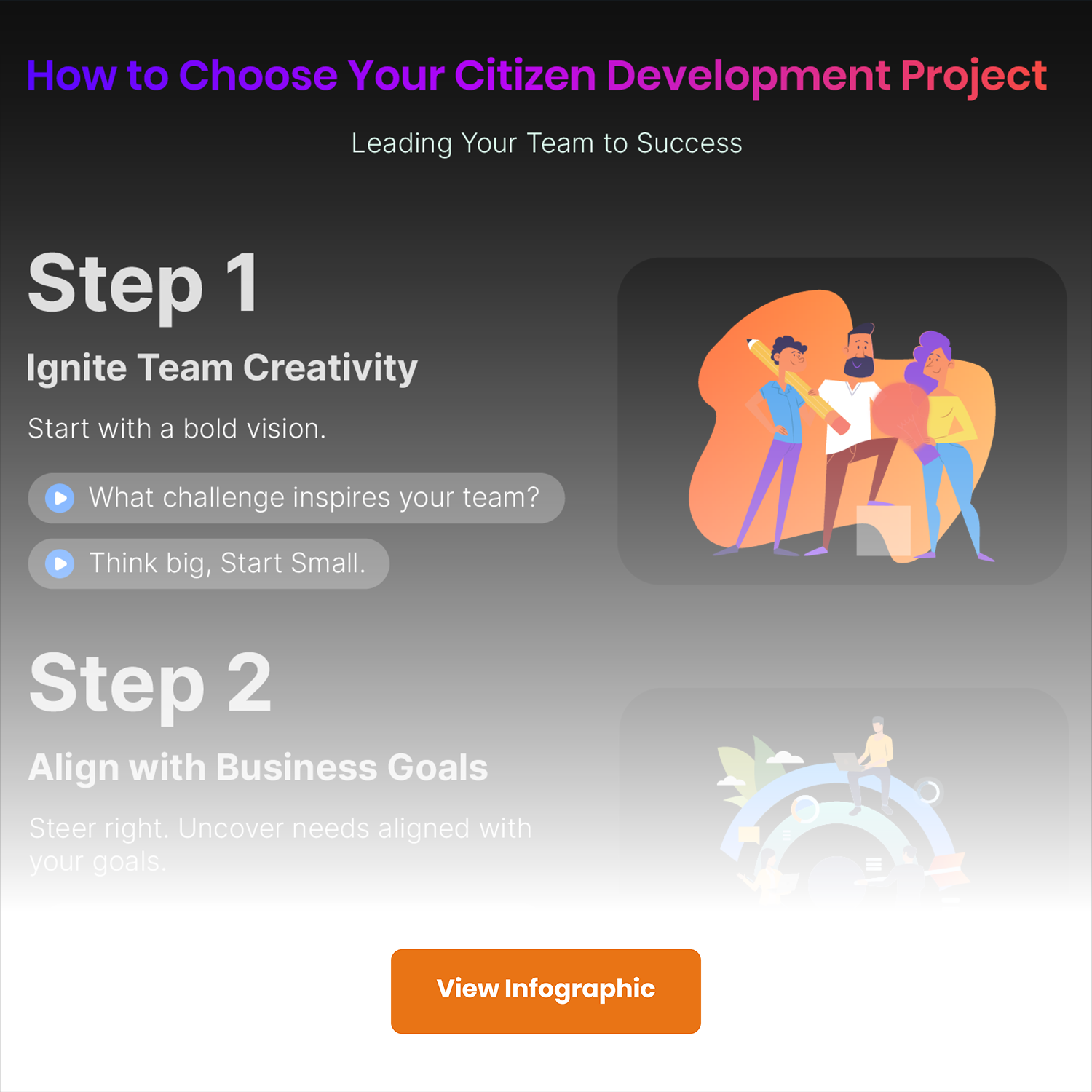
The pressure to innovate quickly and stay competitive has pushed organizations to rethink how they build and deliver solutions. Traditionally, creating new business applications meant long waits for IT resources, lengthy development cycles, and significant budgets — all of which slow down progress and stifle agility.
Citizen development is changing this narrative. By empowering non-technical employees to create apps and automate workflows using no-code and low-code platforms, organizations can tap into a hidden army of innovators already inside their walls. These employees — the “citizen developers” — understand business needs deeply and can rapidly build solutions tailored to real-world challenges.
This approach isn’t just about faster app delivery; it’s about democratizing innovation and transforming the entire organization into a more agile, adaptive, and future-ready enterprise. As more companies embrace this movement, citizen development is proving to be a powerful force driving digital transformation from the ground up.
Gartner predicts that, 70% of new app development in enterprise organizations will leverage low-code or no-code technologies.
Definition and Evolution of Citizen Development
Citizen development refers to the practice of enabling non-IT employees — also known as “citizen developers” — to design, build, and deploy applications without needing deep programming skills. Using intuitive no-code and low-code platforms, these employees can automate workflows, build custom tools, and solve unique business problems on their own.
The concept of empowering business users to build solutions isn’t entirely new. Early forms can be traced back to the use of macros in spreadsheets and simple database tools. However, the rise of sophisticated citizen development platforms over the past decade has significantly expanded the possibilities. Today, citizen development has evolved into a strategic movement supported by robust governance frameworks, security protocols, and integration capabilities — transforming it from an experimental idea into a core component of modern enterprise IT strategy.
Citizen development is not about replacing professional developers but rather about augmenting their efforts and amplifying the organization’s overall development capabilities. It enables the quick creation of departmental tools, process automation, and customized solutions while adhering to governance and security standards.
Also Read: A Guide to Suitability Assessment in Citizen Development
Citizen Developers Vs Professional Developers
Citizen developers and professional developers bring unique strengths to the software development landscape. Citizen developers, equipped with no-code and low-code platforms, offer diverse skills and domain knowledge that enable them to create tailored solutions quickly. They excel in agility, responding promptly to emerging needs and reducing IT backlogs. Collaboration is at the core of CD, as it empowers individuals from various departments to contribute their expertise and fosters a culture of innovation.
On the other hand, professional developers bring deep coding knowledge to complex projects and scalability. They adhere to established standards and ensure robustness and security. By combining the strengths of both groups, organizations can drive digital transformation, tap into a wider pool of problem-solving skills, and deliver solutions that meet immediate business needs while adhering to best practices. The synergy between citizen developers & professional developers propels organizations toward a future of innovation and success.
The Role of Non-Technical Users in Digital Transformation
Non-technical users have traditionally relied on IT teams to bring their ideas and business requirements to life. But as digital transformation became a business imperative, the limitations of this dependency became clear: bottlenecks, slow response times, and misalignment between business needs and technical execution.
Citizen development shifts this dynamic by empowering business users to take control. These non-technical employees possess deep knowledge of their own processes and pain points, making them uniquely qualified to design practical, effective solutions. By actively involving them in the application development process, organizations unlock hidden innovation potential, reduce time-to-market for new initiatives, and create a culture of continuous improvement. In essence, citizen developers are becoming the secret force driving digital transformation from within.
Also Explore: Citizen development assessment
Why Citizen Application Development Gaining Momentum
The rise of citizen developers is driven by the increasing demand for customization and agility in today’s business landscape. This trend democratizes innovation, empowering individuals from various departments to contribute their expertise. Citizen development bridges the IT gap by allowing non-technical individuals to create and deploy applications independently, reducing burdens on IT departments. It also empowers business users, enhancing job satisfaction and fostering a culture of innovation.
As move ahead in 2025, the momentum behind citizen development continues to grow stronger than ever before. Several factors are fueling this rise:
- Accelerating demand for digital solutions: The need to adapt quickly to market changes and customer expectations has never been higher.
- Persistent IT backlogs: Traditional development teams are overwhelmed, and business users can’t afford to wait.
- Advancements in no-code/low-code technology: Platforms have become more powerful, secure, and user-friendly, enabling more people to build sophisticated applications with ease.
- Workforce empowerment trends: Organizations increasingly value employee autonomy and engagement, seeing citizen development as a way to foster a culture of innovation and ownership.
- Cost pressures and resource optimization: Businesses are seeking ways to reduce development costs and reallocate IT resources to more strategic, high-value initiatives.
Together, these drivers make citizen development not just a trend but a strategic necessity in 2025 — enabling businesses to stay agile, innovative, and competitive in an ever-changing world.
Also Read: 5 Reasons to Encourage Citizen Development at Work
The Intersection of AI and Citizen Development
The rise of AI and citizen development are two of the most transformative technology trends of our time — and when they intersect, they create endless possibilities. Citizen development was already empowering non-technical employees to build business apps without writing code. Now, by integrating AI, these platforms are taking things even further: enabling smarter, faster, and more personalized solutions.
AI acts as an intelligent assistant within no-code and low-code environments. It helps automate complex tasks, offers intelligent recommendations, and allows citizen developers to build apps that can learn and adapt over time. Together, AI and citizen development unlock innovation at scale and put advanced capabilities directly into the hands of business users. The result? Organizations become more responsive, more efficient, and better equipped to meet the evolving needs of their customers and employees.
How AI Empowers Non-Technical Developers
AI supercharges the citizen developer movement by breaking down even more barriers to entry. Instead of simply dragging and dropping components, non-technical users can now rely on AI-powered features to guide and simplify decision-making throughout the development process.
For example, AI can suggest the most effective workflows, automatically generate forms, or validate business rules in real time — all without requiring technical know-how. Natural language processing (NLP) allows users to describe what they want in plain English, and the system turns those instructions into working apps.
This shift makes it easier than ever for business users to solve specific problems on their own, reduce their dependence on IT teams, and deliver value faster. AI effectively turns employees into “augmented builders,” enhancing their creativity and enabling them to focus on solving business challenges rather than struggling with technical details.
Key AI Features in Citizen Development Tools
Modern citizen development platforms increasingly embed AI capabilities to empower users and extend what’s possible. Some of the most impactful AI features include:
- Chatbots and virtual assistants: Easily integrated into apps to automate customer or employee interactions, reduce manual support tasks, and improve user experiences.
- Workflow automation: AI can identify repetitive processes and suggest or even create automated workflows, freeing up time and reducing human errors.
- Predictive analytics: Helps forecast trends and behaviors, enabling businesses to make data-driven decisions proactively rather than reactively.
These features help citizen developers create more sophisticated, intelligent, and scalable solutions — making the apps they build not only faster to deploy but smarter and more adaptive.
Real-World Applications Across Industries
Healthcare: Mayo Clinic’s No-Code AI Symptom Checker
- Use Case: Clinicians built an AI chatbot using Microsoft Power Apps to triage patient symptoms pre-appointment.
- Result: Reduced ER wait times by 30% and improved resource allocation.
- Source: PMI Citizen Development Case Studies
Logistics: UPS’s Digital Twin for Distribution
- Use Case: Citizen developers created a real-time package tracking system using AI-driven analytics.
- Result: Enhanced supply chain visibility and reduced delivery delays.
- Source: Google Cloud GenAI Use Cases
Manufacturing: Siemens’ AI-Powered Quality Control
- Use Case: Factory workers trained AI models (via Akkio) to detect defects in turbine blades from images.
- Result: 99% defect detection accuracy, saving $500K/year in waste.
- Source: Kissflow AI in Citizen Development
Myths vs Facts of Citizen Development
Discover the facts behind common misconceptions surrounding citizen development And no-code, including its safety, skill requirements, efficiency, functionality, scalability, and security measures.

- Myth: Citizen development is risky.
Fact: Citizen development is a safe and effective approach with proper training and support systems in place to ensure success.
- Myth: Citizen developers lack skills.
Fact: Citizen developers receive training and have access to user-friendly tools that enable them to create powerful applications.
- Myth: Citizen development is time-consuming.
Fact: The platforms offer intuitive interfaces and pre-built components that streamline the app development process.
- Myth: Citizen development is limited in functionality.
Fact: CD platforms provide a wide range of features and integrations, allowing for the creation of robust applications.
- Myth: Citizen development is not scalable.
Fact: CD platforms can scale to support growing demands and accommodate increased user requirements.
- Myth: Citizen development compromises security.
Fact: CD platforms prioritize security measures and offer data protection features to ensure the safety of applications.
Benefits of Citizen Development
It is a transformative approach that empowers non-technical individuals to become drivers of innovation within their organizations. The benefits of citizen development are numerous and profound. Citizen development accelerates application development cycles by enabling business users to independently build applications using intuitive no-code or low-code platforms, leading to faster time-to-market for new solutions.
It promotes increased productivity by reducing reliance on IT resources and allowing IT departments to focus on strategic initiatives. Citizen development also fosters agility and flexibility, enabling organizations to adapt quickly to constantly changing business needs. It brings cost savings by eliminating the need for expensive external resources. Moreover, citizen development promotes collaboration, enhances innovation, reduces IT backlog, improves operational efficiency, empowers employees, and enables scalable growth. Embracing citizen development unlocks a world of benefits that drive success in today’s dynamic business landscape.
Also Read: Strategy for Problem-Solving Culture with Citizen Development
Citizen development empowers individuals without traditional coding skills to become active participants in building applications and automating processes, driving efficiency and unleashing creativity like never before.
Imagine a world where employees across departments and industries can turn their ideas into reality like the Quixy team does, without relying solely on IT departments or external developers. This is the essence of citizen development—a movement that celebrates the democratization of technology and the breaking down barriers.
Real-world examples abound, showcasing its incredible potential. From small startups to large enterprises, individuals embrace no-code platforms and solutions to address complex challenges and drive meaningful change. Citizen developers can swiftly design, test, and deploy applications tailored to their needs with intuitive drag-and-drop interfaces, visual workflows, and pre-built templates.
Also Read: How to Implement and Govern Citizen Development
How Citizen Development Accelerates Digital Transformation
In today’s fast-moving business landscape, organizations must innovate quickly to stay competitive. Traditional IT development cycles often struggle to keep pace with evolving business needs, leading to bottlenecks and missed opportunities. Citizen Development (CD) accelerates digital transformation by empowering business users to build solutions—without deep coding expertise—while delivering measurable business value.
1. Democratizing Innovation: Turning Employees into Problem-Solvers
- Marketing teams automate campaign performance dashboards using Power BI instead of waiting for IT.
- Operations teams replace paper-based field reports with mobile data collection apps built on Quixy.
- HR departments create self-service onboarding portals in OutSystems, reducing manual work by 50%.
Impact: Faster experimentation, reduced dependency on IT, and a culture where employees drive innovation.
2. Cutting Costs: 60–80% Cheaper Than Traditional Development
- Forrester research shows that low-code/no-code (LCNC) solutions reduce development costs by up to 80% compared to custom-coded apps.
- No need to hire expensive developers—existing employees build solutions with intuitive drag-and-drop tools.
- Example: A financial services firm saved $500K/year by replacing an outsourced compliance tracker with an in-house Appian app.
3. Improving Agility: Responding to Market Changes in Days, Not Months
- Retailers deploy customer feedback apps overnight to adapt to shifting preferences.
- Manufacturing teams digitize shop-floor workflows in Mendix to reduce downtime.
- Healthcare providers rapidly build patient scheduling tools during peak demand periods.
Case Study: A logistics company used Quickbase to create a real-time shipment tracking system, reducing delays by 30%—all without IT involvement.
4. Enhancing Customer & Employee Experience
- Sales teams build custom CRM add-ons to personalize client interactions.
- Support teams automate ticket routing, cutting resolution times by 40%.
- Employees get self-service tools (leave requests, expense approvals), boosting productivity.
5. Scaling Digital Transformation Sustainably
Unlike one-off IT projects, CD fosters continuous improvement:
✔ Business teams iterate on apps as needs evolve.
✔ IT shifts focus from firefighting to strategic innovation.
✔ Governance ensures security and scalability.

Best Practices for Successful Citizen Development
Best practices serve as guiding principles that empower citizen developers to create impactful solutions, drive positive change, and achieve remarkable results in their journey. Before we dive into tips for thriving citizen development, let’s look at the risks and compliance concerns we should keep in check for successful no-code development.
In the world of citizen development, minimizing risks and ensuring compliance is crucial. Here are some strategies for success!

- Engage Stakeholders: Involve key stakeholders from the beginning and address their concerns to foster collaboration.
- Establish Governance Frameworks: Set clear guidelines, policies, and compliance requirements for citizen development initiatives.
- Promote Training and Knowledge Sharing: Provide training for citizen development programs and encourage knowledge exchange within the citizen developer community.
- Implement Security Measures: Prioritize security throughout the development process with secure coding practices and regular vulnerability assessments.
- Monitor and Evaluate: Continuously monitor and review citizen-developed applications to maintain compliance and address any issues promptly.
With these strategies, you can reduce risks, ensure compliance, and create a secure environment for successful citizen development implementation & initiatives. Also, the citizen development value tree can help as guiding compass, aligning everyone towards a crystal-clear project vision.
Citizen Development Framework
A CD framework refers to a structured approach or set of guidelines that organizations can follow to effectively enable and govern citizen development initiatives. It provides a framework for empowering non-technical users (citizen developers) to create and deploy applications or solutions with low-code or no-code platforms. If you’re new to citizen development, here are some tips to help you thrive:

- Define Clear Goals: Clearly articulate the problem you want to solve and establish specific, measurable goals.
- Start Small: Begin with manageable projects to gain confidence and demonstrate the value of citizen development.
- Select the Right Tools: Choose user-friendly development platforms that align with your goals and technical capabilities.
- Embrace Collaboration: Collaborate with other citizen developers, IT professionals, and subject matter experts to enhance your skills and knowledge.
- Iterate and Improve: Use an iterative development approach, gather feedback, and continuously refine your applications.
By following these tips, you can embark on a successful citizen development journey and create valuable solutions. You can also refer to our comprehensive guide to kick-start your citizen development project.
Challenges and Ethical Considerations
While citizen development and AI integration open up incredible opportunities, they also bring important challenges and ethical questions to the forefront. Organizations must carefully consider how to balance innovation with responsibility, ensuring that the drive for speed and efficiency doesn’t come at the expense of security, privacy, or ethical standards.
Risks of Unregulated Citizen Development (Security, Data Privacy)
Empowering non-technical users to build applications introduces a level of decentralization that, if not properly managed, can lead to serious security and compliance issues. Without clear governance, employees might inadvertently create apps that expose sensitive data, violate data privacy laws, or introduce vulnerabilities into core systems.
The lack of technical expertise among citizen developers can sometimes result in misconfigured workflows or poor integration with other systems. In industries like healthcare or finance — where data sensitivity is paramount — these risks can have severe consequences, including regulatory penalties, loss of customer trust, and reputational damage.
To mitigate these risks, it’s essential to implement strong security guidelines, provide training on data privacy best practices, and ensure that IT teams oversee and validate applications before they’re widely deployed.
Balancing AI Automation with Human Oversight
AI brings incredible speed and intelligence to citizen development, but it also raises concerns about bias, accountability, and unintended consequences. When non-technical users rely heavily on AI to make decisions or automate processes, there is a risk that errors or biases baked into AI models can go unnoticed.
For example, an AI-driven approval app might unintentionally prioritize certain types of requests over others, or a predictive maintenance tool could misinterpret data, leading to unnecessary downtime or equipment failures.
To address these challenges, human oversight is critical. Organizations need to design workflows that allow for human review at key decision points, especially when sensitive data or critical operations are involved. Regular audits of AI outputs, transparent reporting of decision logic, and continuous model training help maintain fairness and accuracy.
Moreover, establishing clear ethical guidelines around AI use — including explainability, accountability, and user consent — ensures that automation enhances rather than undermines organizational integrity. The goal should be to complement human judgment, not replace it entirely.
Future-Proofing Citizen Development with Governance Frameworks
As citizen development matures and expands across organizations, strong governance frameworks become indispensable for long-term success. Governance frameworks define the policies, roles, and standards that guide how citizen development operates within an organization.
Future-proofing means thinking beyond immediate results and ensuring that citizen-developed apps remain secure, scalable, and aligned with evolving business and regulatory requirements. A robust governance framework should include:
- Clear guidelines and guardrails: Establish policies on data handling, security, and compliance to protect against potential risks.
- Approval workflows: Implement mandatory reviews by IT or security teams before apps go live.
- Training and certification: Offer structured learning paths for citizen developers to improve technical literacy and ethical awareness.
- Monitoring and audit mechanisms: Regularly review apps for compliance, security vulnerabilities, and performance issues.
- Feedback and continuous improvement loops: Allow citizen developers and stakeholders to share insights and iterate on policies and tools.
By proactively setting up these frameworks, organizations can empower employees to innovate confidently while minimizing risks and maintaining control. It ensures that citizen development evolves as a strategic asset rather than becoming a source of technical debt or compliance headaches in the future.
How to Become a Citizen Developer – Skills You Need
Becoming a citizen developer doesn’t require extensive coding experience. The essential no-code citizen developer skills are problem-solving, communication, critical thinking, and learning agility. Strong problem-solving skills will help you understand complex challenges and find effective solutions. Mastering effective communication will enable collaboration with stakeholders and clear articulation of your ideas. Sharp critical thinking abilities will assist you in evaluating options and troubleshooting issues that may arise.
Embracing a continuous learning mindset is crucial as no-code tools and technologies evolve. By honing these skills, you can thrive as a citizen developer, contribute to innovative solutions, and make a significant impact in the world of citizen development.
Also Read: No-Code Citizen Development for Future Business Leaders
Features of Citizen Development Platforms
With the right tools and platforms, citizen developers can unleash their creativity, drive innovation, and make a significant impact within their organizations. We will explore the landscape of tools and platforms available for citizen development, highlighting their features, benefits, and recommendations for choosing the best ones to suit your needs.
Citizen development(CD) tools and platforms provide citizen developers with the necessary resources and environments to build applications that address their specific needs. Here are some key features and characteristics of such tools and platforms:
- Low-Code No-Code Development: CD tools often employ a no-code low-code approach, which means they provide visual interfaces, drag-and-drop functionality, and pre-built components to simplify the development process. This enables citizen developers to create applications without writing extensive lines of code.
- Customization and Configuration: Citizen development(CD) tools emphasize the ability to customize and configure applications to match specific requirements. Users can leverage predefined templates, themes, and workflows to tailor their applications without delving into complex coding.
- Integration Capabilities: These tools offer integration capabilities, allowing citizen developers to connect their applications with existing systems, databases, or third-party services. This facilitates data exchange and ensures interoperability with other tools or platforms in the organization’s technology stack.
- Collaboration and Sharing: Citizen development platforms typically provide collaboration features that enable multiple users to work together on the same application. They also offer sharing options to distribute applications within an organization or community.
- Security and Governance: As citizen development involves individuals without formal programming backgrounds, tools and platforms need to prioritize security and governance. They implement safeguards to protect sensitive data, enforce access controls, and adhere to compliance standards.
Also Read: No-Code Low-Code Citizen Development Statistics, Facts, and Trends you cannot miss!
Best Citizen Development Platforms
When it comes to the best CD tools and platforms, several niche no-code tools cater to specific industries or use cases. While Quixy is a noteworthy option, let’s explore some other niche tools & no-code platforms with Quixy that excel in their respective domains:
- Quixy: Quixy is a versatile no-code platform that empowers citizen developers to build complex applications without coding. It offers a visual interface, drag-and-drop functionality, and robust workflow automation capabilities. Quixy excels in providing rapid application development, seamless integration with data sources, and a strong focus on data security and compliance.
- Bubble: Bubble is a powerful no-code platform specifically geared towards web and mobile app development. It offers a visual interface, drag-and-drop functionality, and a wide range of customization options.
- Airtable: Airtable is a collaborative no-code tool that combines the functionalities of spreadsheets and databases. It enables citizen developers to create custom data-driven applications, project management systems, and content management solutions.
- Zapier: Zapier is an integration-focused no-code platform that enables users to connect various web applications and automate workflows.
- Adalo: Adalo is a no-code platform specifically designed for building mobile apps. It offers a visual interface with a component library, allowing citizen developers to create native iOS and Android applications
Including these niche no-code tools alongside Quixy provides a comprehensive list that caters to various development needs and industry-specific requirements. Remember to evaluate each tool based on its features, ease of use, scalability, support, and pricing to determine the best fit for your initiatives.
Citizen Development Real World Case Studies
1. Application Development Time was Reduced by 60% for Compass Group
Compass Group India addressed interdepartmental challenges by adopting Business Process Automation with Quixy’s no-code platform. Automating seven key workflows, including Capex requisition and vendor onboarding, streamlined processes and reduced app development time by over 60%. Quixy’s drag-and-drop designer and workflow configurator facilitated this transformation, resulting in cost reduction, improved visibility, transparency, and traceability. Compass Group India successfully achieved impressive results with Quixy’s powerful platform.
2. Revolutionizing Inspections: From Manual to Digital, A Success Story
In just 15 days, HMWSSB leveraged Quixy’s no-code capabilities to build an automated inspection solution, replacing manual excel sheets and documents. The solution provided a comprehensive view of Customer Account Numbers (CANs), enabling real-time validation and tracking. Inspectors now enter data, including payments and inspection details, via a mobile application, eliminating tedious manual processes. Reports are automatically generated and shared with stakeholders, ensuring transparency and faster decision-making.
The benefits include streamlined data consolidation, cost and time savings, improved transparency, enhanced work efficiency, and reduced paperwork. HMWSSB successfully achieved a digital transformation with Quixy’s powerful platform.
3. How Quixy’s in-house team uses Quixy!
Citizen developers within the Quixy team have leveraged the platform to create custom applications that address specific needs. For instance, they built a content management app that streamlined the content creation process, resulting in improved efficiency and higher-quality content.
They also developed an invoice app to streamline the invoicing process for their digital marketing team, ensuring timely payments and better financial management. Moreover, they created a centralized project management app, an employee self-service app for service requests and improvement suggestions, an HR recruitment requisition app, a knowledge-sharing app, an incident management app, and a leave management app.
These success stories demonstrate the versatility and scalability of Quixy as a no-code platform. By leveraging Quixy, businesses can automate workflows, manage data, enhance collaboration, and optimize various processes. Join the Quixy community and experience the transformative power of no-code app development in boosting productivity and efficiency.

Measuring Citizen Development Impact with KPIs and ROI
Citizen Development has emerged as a game-changing approach, allowing non-technical individuals to create applications that enhance business processes. Key Performance Indicators (KPIs) and Return on Investment (ROI) play a pivotal role in measuring the success of Citizen Development initiatives. KPIs help track the effectiveness of these projects, offering insights into their impact on efficiency and productivity. ROI, on the other hand, quantifies the value gained from these initiatives, reflecting the financial benefits they bring. Understanding how to define, measure, and optimize Citizen Development KPIs and ROI is essential for organizations seeking to harness the full potential of this dynamic approach.
The Future of Citizen Development – Emerging Trends
As organizations embrace digital transformation, citizen development is poised to play a significant role in shaping the future. With the increasing demand for customized applications, citizen developers are becoming crucial contributors to innovation. They possess domain expertise and a deep understanding of business processes, allowing them to create tailored solutions that address specific needs. This trend is driving the development of user-friendly, no-code platforms that empower citizen developers to rapidly build and deploy applications.
With the right training and support, citizen development will continue to evolve, enabling organizations to achieve greater agility, efficiency, and innovation in their digital transformation journey.
Also Read: Meet the Top Citizen Development Influencers
How Quixy Can Help in Your Citizen Development Journey
To fully leverage CD, organizations need the right platform—one that balances ease of use with enterprise-grade control. Quixy is a leading no-code solution designed to accelerate digital transformation while maintaining security and scalability.
1. Drag-and-Drop App Builder
- Business analysts, HR teams, and operations managers can build custom apps (e.g., procurement trackers, project management dashboards) without writing a single line of code.
- Visual workflow designers automate approvals, notifications, and data processing.
2. Pre-Built Templates for Rapid Deployment
- Jumpstart development with ready-made templates for:
- Employee portals (onboarding, training)
- Service request systems (IT helpdesk, facilities management)
- CRM & sales pipelines
- Customize in hours, not weeks.
3. Enterprise-Grade Security & Compliance
- IT retains full control over user permissions, data access, and integrations (SAP, Salesforce, Microsoft 365).
- SOC 2 & GDPR compliant—ensuring data protection and regulatory adherence.
- Audit logs track all changes for governance.
4. Scalability: From Simple Apps to Complex Workflows
- Start small (e.g., a leave management app) and scale to enterprise-grade solutions (e.g., ERP extensions).
- AI-assisted automation suggests optimizations for workflows.
Conclusion
Citizen development has emerged as a powerful approach to driving business growth and innovation. Key takeaways include the fact that it is a safe and effective method when supported by proper training and support systems. Citizen developers have access to user-friendly tools and training that enable them to create powerful applications. The perception of citizen development as time-consuming and limited in functionality is debunked, as modern platforms offer intuitive interfaces and a wide range of features. Moreover, it is scalable and prioritizes security. Organizations can tap into the potential of their workforce to drive digital transformation and achieve remarkable results.
Embrace the approach as a strategic approach to foster innovation and drive business growth. By leveraging the skills and expertise of your workforce, you can unlock immense potential and rapidly build applications tailored to your unique needs. Quixy, a leading no-code platform, empowers citizen developers with its intuitive drag-and-drop interface, extensive feature set, and robust security measures. You can also check out Citizen Developer’s Toolbox: Insights and Strategies from Our eBook-Innovate and Empower: A Journey through Citizen Development!
Discover the boundless possibilities of CD with Quixy and seize new opportunities for innovation, agility, and business growth. Begin your journey towards streamlined operations and tailored apps – all with the simplicity of our platform. Get started today to harness the potential of automation.
Frequently Asked Questions (FAQs)
Q. What is citizen development?
It enables non-technical users to create applications using low-code or no-code platforms. It empowers individuals without coding expertise to contribute to app development, fostering innovation and agility within organizations.
Q. What are the advantages of citizen development?
Citizen development offers several benefits, including accelerated app development, reduced IT backlog, increased productivity, improved customer satisfaction, and cost savings. It enables organizations to address business needs faster, promotes collaboration between business and IT teams, and drive digital transformation.
Q. How does LCNC development facilitate citizen development?
Low-code or no-code platforms provide visual interfaces, pre-built components, and drag-and-drop functionality, simplifying the app development process. They eliminate the need for complex coding, making it accessible for non-technical users to build applications through intuitive and user-friendly interfaces.
Q. what are some examples of successful citizen development projects?
Successful CD projects include creating custom workflow automation tools, building internal productivity apps, designing customer-facing portals, and developing data visualization dashboards. These projects showcase the versatility of citizen development across various industries and use cases.
Q. How does citizen development contribute to business agility?
Citizen development fosters business agility by empowering users to quickly create applications that address specific business needs. It reduces reliance on IT departments, allowing teams to iterate and adapt applications faster. This promotes innovation as citizen developers can experiment and introduce new ideas into the development process, driving continuous improvement and flexibility within organizations.
Q. What are citizen development models?
Citizen development(CD) models include centralized, decentralized, hybrid, community-driven, and platform-centric approaches. The centralized model centralizes citizen development within a specific team or department, providing governance and support. In the decentralized model, citizen development is distributed across different departments, fostering agility and innovation. The hybrid model combines elements of centralization and decentralization, ensuring a balance between control and autonomy.
The community-driven model emphasizes collaboration and knowledge sharing among citizen developers. The platform-centric model focuses on using a specific low-code or no-code platform for citizen development, providing training and resources. Organizations should choose a model that suits their goals, culture, and resources, while considering governance and collaboration needs.
Subscribe
Login
Please login to comment
0 Comments
Oldest















